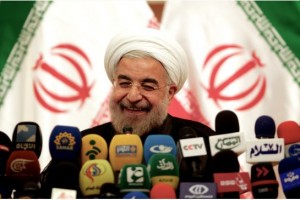 Hassan Rouhani is a centrist who has kept lines of communication open to most of Iran's competing power centres.
Hassan Rouhani is a centrist who has kept lines of communication open to most of Iran's competing power centres.The inauguration of a new president in�Iran�is an opportunity for sending messages and�Hassan Rouhani�did not waste it. He told America in�his inauguration speech yesterday�that if it wanted an adequate response from Iran, it should not speak in the language of sanctions. To distance himself from his predecessor, Mahmoud Ahmadinejad, Mr Rouhani promised a government of wisdom and hope. He genuflected to the concept of moderation, refrained from naming any country that Iran considered averse to its interests, and the word "enemy" was missing altogether. Foreign dignitaries were invited to attend for the first time and it is a pity that from Europe only Javier Solana chose to take the offer up.
Mr Rouhani is not a reformist. He is a centrist who has kept lines of communication open to most of Iran's competing power centres � the Revolutionary Guards, the clergy and the Majlis, the parliament. Above all, according to Trita Parsi, head of the National Iranian American Council, Mr Rouhani will not repeat Ahmadinejad's mistake in challenging the supreme leader. While he used the language of reformists during his campaign, he was clear to declare his loyalty to Ayatollah Ali Khamenei. Mr Rouhani hopes to leverage loyalty for some leeway in setting a more pragmatic foreign policy course. He has already set out on the right track by appointing�Mohammad Javad Zarif�as his foreign minister. Zarif, a former ambassador to the UN, was previously involved in secret bilateral negotiations with the US, and is liked by US diplomats.
Whether or not Mr Rouhani succeeds does not depend solely on competing power centres in Iran. There is a current of thought in US and EU policy-making circles that regards the emergence of a moderate in Mr Rouhani as the product of international pressure and of sanctions. Ratchet the sanctions up further, as the�US House of Representatives has just attempted to do, and Iran will bend a little further, or so this theory goes. It could not be more ill-judged. The anti-sanctions movement in Iran is broadly based. The movement comprises reformists and conservatives alike, and in seeking to lift the sanctions yoke, Mr Rouhani is speaking for everyone in Iran. Starting to lift the sanctions will require more than just the evidence of Iranian moves towards a solution to the question of nuclear enrichment. It will need political will, and the spending of political capital. The White House reaction, which said that Tehran would find a willing partner in the US should it choose to engage, was good, but Barack Obama has also to overcome the belligerence of Congress. While the White House did not like the house's bill, it did not spend time in trying to amend it.
Mr Rouhani has already been once round the track of compromise and failure. As chief nuclear negotiator under President Mohammad Khatami, Iran agreed for the first time to stop enriching uranium and allowed more international scrutiny of the Iranian programme. Again, the interpretation of Iran's motives for suspending enrichment is a matter of debate, but the fact is it happened and failed to achieve a reciprocal move from the then Bush administration. Total suspension of enrichment is not on the cards today, but Mr Rouhani will be cautious not to allow himself to be as exposed to the criticism as he was then that he was too soft with the US and got nothing in return. The lesson for Mr Obama is not to cut the ground from underneath Mr Rouhani's feet a second time.
Looking around the Middle East, it is not easy to be an optimist. Fires are raging everywhere. Iran's Revolutionary Guards � despite Mr Rouhani's protestations that Iran was looking to ease tensions � are up to their necks in Syria and in maintaining a physical link with Hezbollah, which they train and arm. In negotiating with Iran, a vision unimpeded by wishful thinking is essential. But an appreciation of how much worse this could get if another Gulf war were to be sparked by an attack on Iran's nuclear installation is also needed. If a deal is there to be done with Iran, it should be seized.
By The Guardian
The Iran Project is not responsible for the content of quoted articles.










